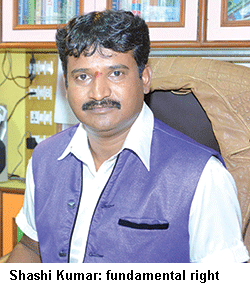 The jd (s)-congress coalition government of Karnataka (pop. 68 million), cobbled together after much parleying and deliberation following an inconclusive election in May, intends to “streamline private schools” during its tenure. As a first step, the new government is reportedly set to deny NOCs (no objection certificates) to private school promoters for three years. The objective: to stem the swelling exodus of children from free-of-charge government to private schools.
The jd (s)-congress coalition government of Karnataka (pop. 68 million), cobbled together after much parleying and deliberation following an inconclusive election in May, intends to “streamline private schools” during its tenure. As a first step, the new government is reportedly set to deny NOCs (no objection certificates) to private school promoters for three years. The objective: to stem the swelling exodus of children from free-of-charge government to private schools.
The education ministry’s department of primary and secondary education has 2,429 pending applications from private edupreneurs, charitable trusts and societies to promote new schools or upgrade existing schools with the largest number of applications (575) from Bangalore, the state’s admin capital. And even as admission into the state’s 14,048 private schools has become a nightmarish experience for citizens because of a huge demand-supply imbalance, 261 government primaries and 57 higher primaries in the state have registered zero incremental admissions for the current academic year (2018-19).
According to the latest (2017-18) DISE (District Information System Education) data, there are 43,712 government elementary (classes I-VIII) schools in Karnataka as against 14,048 private elementaries. However, student enrolment is almost equivalent — 3.86 million in government and 3.51 million in private schools.
Indeed, government schools have been steadily losing students over the years as parents have become aware of the importance of measurable learning outcomes, supportive infrastructure and above all, English language teaching-learning. Between 2010-2016 the number of students in government elementaries declined by 600,000 even as aggregate enrolment in private schools increased by 700,000. With the number of students in 2,959 government elementaries falling to less than ten, the previous Congress government proposed to shut them down. However, strong protests from several influential educationists (including V.P. Niranjanaradhya of the National Law School University) and Kannada language champions who argue that the Right of Children to Free and Compulsory Education (RTE) Act, 2009, mandates a government school within 1 km walking distance of every village and urban habitat, stalled the proposal. The new coalition government is reportedly set to “merge” a larger number of 3,540 unviable government elementaries. But this proposal is likely to meet a similar fate.
Inevitably, the moratorium on new private schools proposal has incensed private schools’ associations in the state. “After the Supreme Court’s verdict in the T.M.A. Pai Foundation Case (2002), all citizens have a fundamental right to enter the ‘occupation’ of education provision. Therefore, if the new JD (S)-Congress government imposes a blanket ban on greenfield private schools, we will go to court which is sure to strike it down as unconstitutional. Moreover, the government cannot deny permission to new private schools as it has already collected application forms following its own advertisements calling for new private schools and has collected processing fees of Rs.7,000-100,000 from applicants,” says D. Shashi Kumar, general secretary of the Karnataka Associated Managements of English Medium Schools (KAMS), which has a membership of 1,400 schools statewide.
Although the establishment and Kannada language champions, who are opposed to English language teaching in government primaries for reasons ranging from protecting teaching jobs of kith and kin in Kannada medium schools, to involvement in vernacular textbooks printing rackets, seem to be unaware, the major cause of the continuous exodus of children from government schools is their reluctance and/or incapability to teach English which private elementaries offer as the medium of instruction. The only option available to them to prevent the flight of children from government schools is to find the funding to improve their pathetic infrastructure, teach English and improve learning outcomes. The days when the courts and/or public opinion accepted the creation of government monopolies are long gone.
Sruthy Susan Ullas (Bangalore)